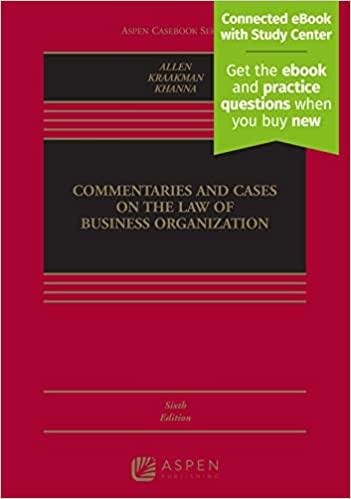Question
Regarding U.S. tort and its law, With which of the following statements would the writer most likely agree? A) Battery is not an appropriate cause
Regarding U.S. tort and its law, With which of the following statements would the writer most likely agree?
A) Battery is not an appropriate cause of action for a violation of a plaintiff's physical security and bodily integrity
B) A toxic battery threatens victim's physical security and bodily integrity
C) The battery cause of action is only relevant in today's society if it captures all types of toxic torts
D) The battery cause of action is the best cause of action to use to obtain recovery where a toxic substance has been intentionally placed into contact with someone
The battery cause of action addresses the personal indignities resulting to one person from another's wrongful acts. Today, battery compensates victims for nonconsensual violations of their interest in physical security and bodily integrity. The essence of a battery cause of action continues to be an offense to personal dignity.
In order to establish a prima facie case for battery, a plaintiff must show that the defendant intended to cause a harmful or offensive touching, and that such an offensive contact occurred. The contact the defendant causes does not have to be direct physical contact, but can be the result of the defendant putting some force into motion that causes the contact. The plaintiff does not even have to be conscious of the contact when it occurs. Therefore, plaintiffs can fulfill this extended contact requirement when the defendant sets out poisoned food for the plaintiff to eat.
Given the fact that intent and contact are defined broadly under the law, battery is a useful means of recourse for environmental harms. Although courts may be reluctant to recognize this novel approach to toxic torts liability, the expanding nature of tort law does not bar recovery merely because the claim is novel. Despite the fact that plaintiffs rarely use battery in environmental torts, the traditional tort of battery is well suited to hazardous substance litigation because it provides liability any time an actor intentionally causes another to come into contact with an offensive foreign substance.
Step by Step Solution
There are 3 Steps involved in it
Step: 1

Get Instant Access to Expert-Tailored Solutions
See step-by-step solutions with expert insights and AI powered tools for academic success
Step: 2

Step: 3

Ace Your Homework with AI
Get the answers you need in no time with our AI-driven, step-by-step assistance
Get Started


